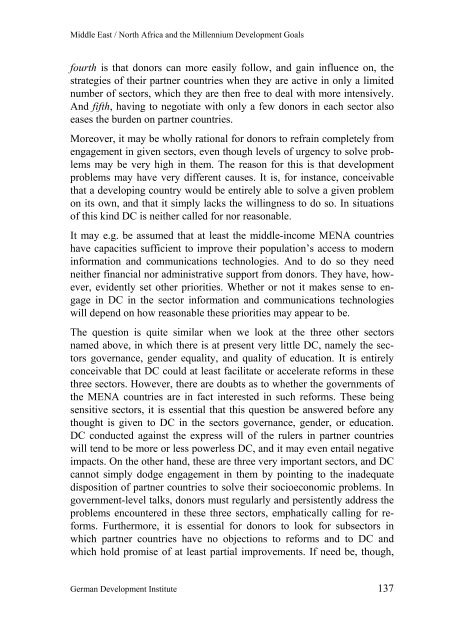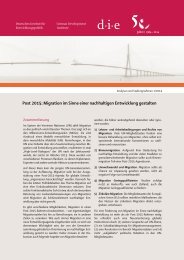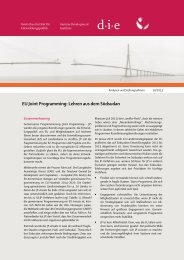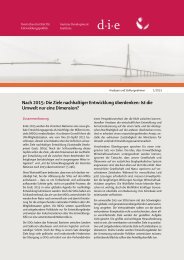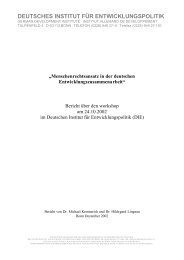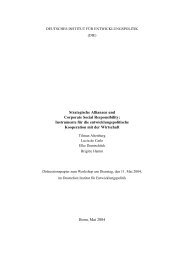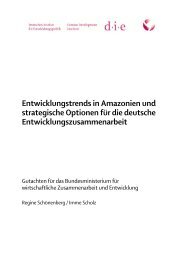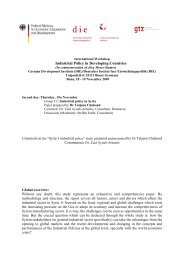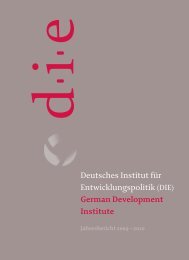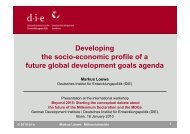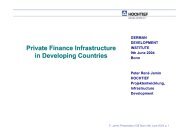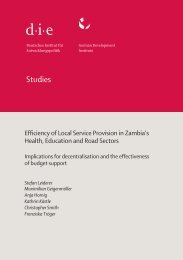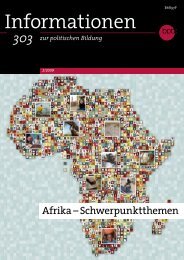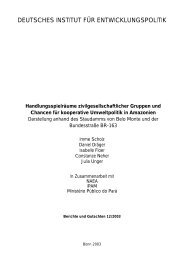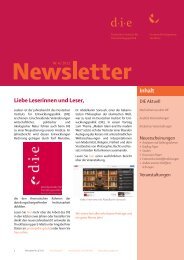Middle East / North Africa and the Millennium Development Goals ...
Middle East / North Africa and the Millennium Development Goals ...
Middle East / North Africa and the Millennium Development Goals ...
Create successful ePaper yourself
Turn your PDF publications into a flip-book with our unique Google optimized e-Paper software.
<strong>Middle</strong> <strong>East</strong> / <strong>North</strong> <strong>Africa</strong> <strong>and</strong> <strong>the</strong> <strong>Millennium</strong> <strong>Development</strong> <strong>Goals</strong><br />
fourth is that donors can more easily follow, <strong>and</strong> gain influence on, <strong>the</strong><br />
strategies of <strong>the</strong>ir partner countries when <strong>the</strong>y are active in only a limited<br />
number of sectors, which <strong>the</strong>y are <strong>the</strong>n free to deal with more intensively.<br />
And fifth, having to negotiate with only a few donors in each sector also<br />
eases <strong>the</strong> burden on partner countries.<br />
Moreover, it may be wholly rational for donors to refrain completely from<br />
engagement in given sectors, even though levels of urgency to solve problems<br />
may be very high in <strong>the</strong>m. The reason for this is that development<br />
problems may have very different causes. It is, for instance, conceivable<br />
that a developing country would be entirely able to solve a given problem<br />
on its own, <strong>and</strong> that it simply lacks <strong>the</strong> willingness to do so. In situations<br />
of this kind DC is nei<strong>the</strong>r called for nor reasonable.<br />
It may e.g. be assumed that at least <strong>the</strong> middle-income MENA countries<br />
have capacities sufficient to improve <strong>the</strong>ir population’s access to modern<br />
information <strong>and</strong> communications technologies. And to do so <strong>the</strong>y need<br />
nei<strong>the</strong>r financial nor administrative support from donors. They have, however,<br />
evidently set o<strong>the</strong>r priorities. Whe<strong>the</strong>r or not it makes sense to engage<br />
in DC in <strong>the</strong> sector information <strong>and</strong> communications technologies<br />
will depend on how reasonable <strong>the</strong>se priorities may appear to be.<br />
The question is quite similar when we look at <strong>the</strong> three o<strong>the</strong>r sectors<br />
named above, in which <strong>the</strong>re is at present very little DC, namely <strong>the</strong> sectors<br />
governance, gender equality, <strong>and</strong> quality of education. It is entirely<br />
conceivable that DC could at least facilitate or accelerate reforms in <strong>the</strong>se<br />
three sectors. However, <strong>the</strong>re are doubts as to whe<strong>the</strong>r <strong>the</strong> governments of<br />
<strong>the</strong> MENA countries are in fact interested in such reforms. These being<br />
sensitive sectors, it is essential that this question be answered before any<br />
thought is given to DC in <strong>the</strong> sectors governance, gender, or education.<br />
DC conducted against <strong>the</strong> express will of <strong>the</strong> rulers in partner countries<br />
will tend to be more or less powerless DC, <strong>and</strong> it may even entail negative<br />
impacts. On <strong>the</strong> o<strong>the</strong>r h<strong>and</strong>, <strong>the</strong>se are three very important sectors, <strong>and</strong> DC<br />
cannot simply dodge engagement in <strong>the</strong>m by pointing to <strong>the</strong> inadequate<br />
disposition of partner countries to solve <strong>the</strong>ir socioeconomic problems. In<br />
government-level talks, donors must regularly <strong>and</strong> persistently address <strong>the</strong><br />
problems encountered in <strong>the</strong>se three sectors, emphatically calling for reforms.<br />
Fur<strong>the</strong>rmore, it is essential for donors to look for subsectors in<br />
which partner countries have no objections to reforms <strong>and</strong> to DC <strong>and</strong><br />
which hold promise of at least partial improvements. If need be, though,<br />
German <strong>Development</strong> Institute 137


